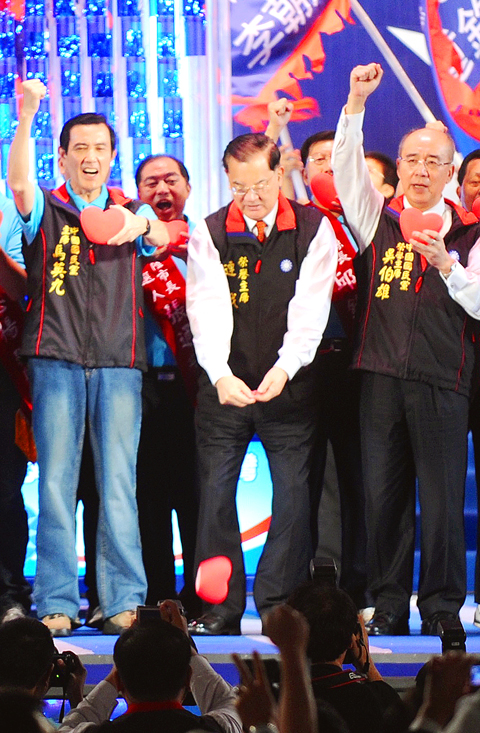If President Ma Ying-jeou (馬英九), who yesterday took over as chairman of the Chinese Nationalist Party (KMT), cares only about his personal integrity but is unable to control his party, then he is unfit to lead the KMT, Democratic Progressive Party (DPP) Chairperson Tsai Ing-wen (蔡英文) said in a TV interview yesterday.
Tsai urged voters to be fully cognizant of the failings of the KMT when they cast their votes for the year-end election in December.
Panning the KMT for continuing to use the “archaic” tactics of vote-buying and bribery in elections, Tsai said the party’s “pompous attitude” was an obvious indication of how it underestimates the wisdom of voters and sabotages Taiwan’s democracy.

PHOTO: LO PEI-DER, TAIPEI TIMES
Since the last legislative election, three KMT lawmakers have been stripped of their titles after being found guilty of vote-buying. Two more KMT lawmakers face the same charges.
“Ma has always touted himself as a person of integrity and high moral values. If that is true, what good does it do if his party remains corrupt? If he thinks that all a party chairman needs to do is remain clean, then he is unfit to be one. The age of heroism has passed. Now is the time for the party to regroup and stand in solidarity,” Tsai said.
In a statement, the DPP yesterday listed three appeals to the newly installed chairman: allow an independent commission to evaluate the KMT’s possible illicit party assets; normalize Taiwan’s election process by eliminating all illegal campaign tactics; and push for an amendment to the Referendum Law (公民投票法) to give the public a fair chance to voice their opinions.
During the interview, Tsai said DPP research shows that the chance of the party winning a multiple victory in the year-end local government chief elections is looking brighter than ever. The toughest battle remains the KMT’s longstanding practice of vote-buying or paying off local leaders to sway constituents, she said.
The DPP, however, should not count on winning in the elections solely because of the KMT’s ineptness or apparent disunity, but rather, all DPP nominees must work together to persuade voters through their actions and pragmatic policies, she said.
If the DPP sweeps the December elections, which represent nearly 9 million people, she said, it would be a major confidence booster for the party to gear up for next year’s mayoral elections for Taipei, Taichung, Tainan and Kaohsiung, which will represent approximately 14 million people.
Tsai also called on the KMT, which occupies two-thirds of the legislature’s seats, to consent to a referendum on the government’s highly debated economic cooperation framework agreement (ECFA) with China.
Earlier this week, the Council of Labor Affairs said it will provide three months of unemployment benefits for people who are directly impacted by the trade deal.
“The responsibility of the government is to create jobs, not merely to provide a three-month subsidy when people lose their jobs. If the government insists on operating according to this logic, then an ECFA will undoubtedly be the biggest disaster in Taiwan’s history,” Tsai said while urging voters to express their suspicion of the pact through their ballots.
When asked if Tsai would lead the battle next year by joining in one of the races, the chairperson remained non-committal except to say that her duty as party chief is to make sure party policies are formulated and executed properly.

Taiwan is to commence mass production of the Tien Kung (天弓, “Sky Bow”) III, IV and V missiles by the second quarter of this year if the legislature approves the government’s NT$1.25 trillion (US$39.78 billion) special defense budget, an official said yesterday. Commenting on condition of anonymity, a defense official with knowledge of the matter said that the advanced systems are expected to provide crucial capabilities against ballistic and cruise missiles for the proposed “T-Dome,” an advanced, multi-layered air defense network. The Tien Kung III is an air defense missile with a maximum interception altitude of 35km. The Tien Kung IV and V

The disruption of 941 flights in and out of Taiwan due to China’s large-scale military exercises was no accident, but rather the result of a “quasi-blockade” used to simulate creating the air and sea routes needed for an amphibious landing, a military expert said. The disruptions occurred on Tuesday and lasted about 10 hours as China conducted live-fire drills in the Taiwan Strait. The Civil Aviation Administration (CAA) said the exercises affected 857 international flights and 84 domestic flights, affecting more than 100,000 travelers. Su Tzu-yun (蘇紫雲), a research fellow at the government-sponsored Institute for National Defense and Security Research, said the air

Taiwan lacks effective and cost-efficient armaments to intercept rockets, making the planned “T-Dome” interception system necessary, two experts said on Tuesday. The concerns were raised after China’s military fired two waves of rockets during live-fire drills around Taiwan on Tuesday, part of two-day exercises code-named “Justice Mission 2025.” The first wave involved 17 rockets launched at 9am from Pingtan in China’s Fujian Province, according to Lieutenant General Hsieh Jih-sheng (謝日升) of the Office of the Deputy Chief of the General Staff for Intelligence at the Ministry of National Defense. Those rockets landed 70 nautical miles (129.6km) northeast of Keelung without flying over Taiwan,

A strong continental cold air mass is to bring pollutants to Taiwan from tomorrow, the Ministry of Environment said today, as it issued an “orange” air quality alert for most of the country. All of Taiwan except for Hualien and Taitung counties is to be under an “orange” air quality alert tomorrow, indicating air quality that is unhealthy for sensitive groups. In China, areas from Shandong to Shanghai have been enveloped in haze since Saturday, the ministry said in a news release. Yesterday, hourly concentrations of PM2.5 in these areas ranged from 65 to 160 micrograms per cubic meter (mg/m³), and pollutants were